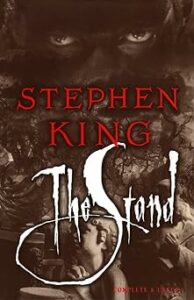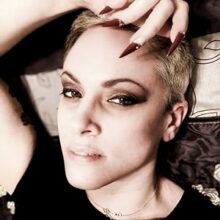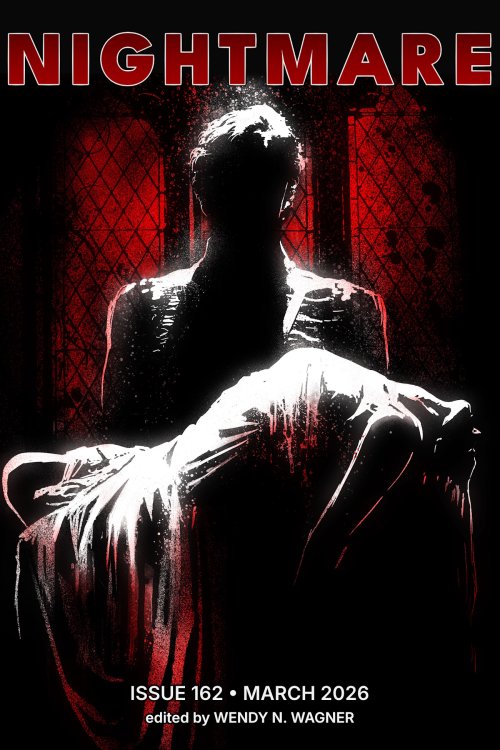The Stand: The Complete and Uncut Edition
Stephen King
Hardcover / Paperback / Ebook
ISBN: 0385199570
Doubleday, May 1990, 1,152 pages
(other editions available)
 Let me begin as simply as I can: It’s really weird to revisit Stephen King’s The Stand in late 2023.
Let me begin as simply as I can: It’s really weird to revisit Stephen King’s The Stand in late 2023.
Here’s where the simplicity stops, because said weirdness is multifaceted, and each facet is rooted in a variety of different variables, such that anything I wanted to write about it could easily balloon to a truly unwieldy size—appropriate, perhaps, for a book which clocked in at over eight hundred pages in its initial publication and then expanded to over thirteen hundred in a subsequent release (naturally this latter version is the one I first read and to which I therefore returned when I decided to attempt to develop A Take on the whole thing).
I just realized that paragraph was all one sentence. You see what this book can do to you?
It’s weird, is what I’m saying.
I first read The Stand sometime early in high school, as part of the sort of Teenage Stephen King Phase that I think gripped a lot of writers of my genre and generation at some point or other. I don’t think it would be hyperbole to call it formative, as many others of King’s books have been for me. But while it’s the kind of book that can frequently come up in one’s thinking, I haven’t reread it cover to cover in well over fifteen years. So that means here I am, sitting in a world still in the grip of a novel respiratory virus with a body count in the millions, returning to a book which has proved a big enough cultural deal to spawn two different published versions, two limited TV series adaptations, and multiple other related works in multiple mediums—a book which happens to be about a world in the grip of (and then destroyed by) a novel respiratory virus.
How relevant does that fact make it, as a work of fiction? On the far side of thirteen hundred pages, I’m not sure its relevancy is really what interests me most, but it’s hard to read it now and not draw comparisons—points at which it is decidedly relevant.
The spread of the weaponized flu, colloquially known as Captain Trips, responsible for the death of most of the world’s human population takes up only the front third of the book, but in my opinion it’s the most gripping third, starting in a slow burn and ramping up to a fever (ha) pitch of death and madness and institutional dysfunction. How and why this happens—why human beings would do something so patently suicidal as to develop such an uncontrollable weapon in the first place—is something of a preoccupation for King’s characters and for King himself; in the end, the virus is a catalyst for a meditation on all the other things that serve as symptoms of the deeper disease that’s all but killed off humanity. Sociologist Glen Bateman, one of the protagonist band of survivors, refers to that disease as the “death trip,” and seems to identify most features of modern life with it, as well as the ever-present danger that the scattered survivors will organize to reboot civilization as it was, and “start the whole thing going again.”
What precisely the “death trip” actually consists of is somewhat difficult to pin down (or at least I found it so) but if I were pressed, I would say at the root it’s the conviction that we live in a fully rational, orderly, predictable, controllable world—a world without gods or demons, magic or Dark Men. Indeed, the engineered super-flu escapes confinement precisely because—the book implicitly argues—we don’t live in that world at all, and any attempt to return to it is tacking toward catastrophe. This is made horribly plain when a bomb in a shoebox cuts short an attempt by the protagonists of the Boulder Free Zone to attempt to rebuild a structured, orderly society (complete with the reading and ratification of the Constitution). The influence of the demonic Randall Flagg is behind the attack, to be sure, as is the moral frailty and treachery of one Harold Lauder, but the text makes clear that more than anything, the Free Zone allowed itself to become distracted by committees and organization and getting the power back on, restoring the comfort and order of the world that was. Meanwhile, across the Rockies in Las Vegas, Flagg was hard at work preparing a final devastating military strike—an attack on the old ways, by the old ways.
Flagg is not human and can’t be fought or defeated by human means. The Free Zone’s Christian mystic leader Mother Abagail would identify the protagonists’ error as the sin of pride—the sin of thinking that one lives not in God’s world but in Humanity’s.
The thing is, here at the end of 2023, I wouldn’t say that we live in that world either, nor would most of the people I know. I’m not sure what world we live in. Everything feels wildly irrational, precarious, uncertain, alternately surreal and hyperreal, a world both groaning under the unbalanced weight of technology and haunted by demons, battered by plague and climate disaster—one of which we failed to effectively mitigate and the other of which we are failing to forestall. QAnon is ascendant. Conspirituality is a burgeoning cultural force in and of itself. I became a literal practitioner of literal Pagan magic in 2020, for God’s literal sake. And didn’t this year feel like it was death-trippy as hell, and doesn’t next year (this year, as you read this) already look like it’ll probably be worse?
Not to be a downer—happy fucking 2024, right?—but come on.
It’s weird. It’s really dang weird that I just finished rereading The Stand in December 2023 and I have no idea how exactly to feel about it, except that I’m feeling all sorts of things and not all of them agree with each other.
So The Stand is a complicated book. Is it a good book? I mean, I think it is, for whatever my confused opinion is worth. I enjoyed it a lot, as I remember doing all those years ago. It captured me, moved me, engaged me. For a while it also distracted me from the existential dread that haunts my every conscious moment, which is worth a lot these days.
It’s not by any means a perfect book; it’s repetitive and redundant at times, and even at eight hundred pages it could likely do with some trimming at the line-editing level. King is never shy about his stances on things, and probably some would call significant parts of it preachy—just for one thing, there’s a ton of God Stuff in it, and while it’s far from Christian propaganda, the God-aligned characters do end up being pretty unambiguously right.
Like a lot of King’s work, it also contains depictions of marginalized characters that mostly come across as well-intentioned but manage at best to be flawed. The deaf-mute character Nick Andros—one of my favorites when I first came to the book and still a fave today—is written with real depth and humanity, but while I don’t feel qualified to analyze how King’s depiction of those disabilities fails, I’m sure he didn’t even sort of nail the landing there. The intellectually disabled Tom Cullen reads even worse to me; while Tom is written to possess genuine courage and resourcefulness, and is largely respected (or that’s what I assume King intended) and valued by his friends, he also falls into the same tiresome innocent man-child stereotype that we see in The Green Mile’s John Coffey. Speaking of Magical Negros, Mother Abagail is probably one of the most notorious of King’s uses of that trope, and while she’s given a degree of depth and characterization of her own, the broadness of the trope is impossible to ignore.
For 99% of the book, queer people might as well not exist, and for the other 1%, I mostly wish they didn’t. The two depictions of anything like explicit male homosexuality amount to one throwaway character who dies immediately and one scene of genuinely brutal sexual assault that I wouldn’t even really want to count. One minor protagonist is alternately described as bisexual and a lesbian, but we never see her have even the most fleeting queer relationship. Trans people don’t exist at all. Straight sexuality of a kinky variety shows up, but only to emphasize the essential moral bankruptcy of Harold Lauder (Harold is also fat for much of his arc, and long-time readers of Stephen King will know that virulent fatphobia is a really unfortunate repeat occurrence in his work).
And all of this is another point where I come away from this book feeling very ambivalent. One of the things that’s always caught me about King’s work is how deeply his sympathies often lie with the downtrodden and oppressed, especially with abused children and women; as a lonely kid caught in the midst of multiple intersecting abusive dynamics, it meant a huge amount to me to be able to vanish into these books where I felt like the author was at least mostly on my side. But now, rereading as a queer nonbinary horror writer with an attraction to the monstrous and a sexuality that leans in some decidedly kinky directions, I find that I don’t feel as welcome in this world. The protagonists of The Stand are so aggressively normie, so wholesome, that at times I look at the Boulder Free Zone, and then at Flagg’s violently authoritarian Las Vegas, and I find myself yearning for a third option. Somewhere up in Canada, maybe, where all us adherents of the Satanic Marxist Trans Agenda can set up a weird little commune and be weird little goblins on our own while the Randalls Flagg and the Mothers Abagail of the world fight it out.
But I still really like this book. I’m simply no longer sure of what else I feel.
It’s weird, is what I’m saying. It’s really dang weird. It’s been a weird dang year. It’s been a weird dang decade. I don’t see any of it getting less so. And maybe that just means The Stand is as much a Book of Our Time as anything else King’s ever written.









